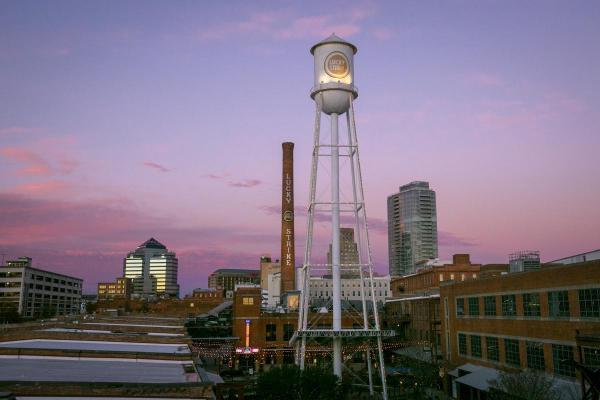Discover Durham

Durham isn't just home to a top-rated medical school, health system, and university—it's also among the country's fastest-growing and most livable areas, AND in a recent report from Moody's Analytics, Durham was named as being 'one of the best positions' to recover from the coronavirus pandemic. Adam Kamins, a senior regional economist at Moody's, found that the "most dynamic recoveries" won't be in urban powerhouses like New York City but in "areas poised to lead the way before everything changed." Durham, Raleigh, and Chapel Hill (The Triangle) offer a reasonable cost of living, a robust school system, and many rich and varied opportunities to explore, engage, and discover. And moving to Durham is a smart choice–it was just named the 4th Most Educated City in the U.S.!

With more than 8,500 new jobs paying a living wage, $1.3 billion of investments, and 6.6 million square feet of commercial space, Durham is a city on the rise. The area is home to many innovative and established companies, such as IBM, GlaxoSmithKline, Fidelity, RTI International, Red Hat, SAS, Epic Games, Burt's Bees, and many more internationally known employers. Durham is part of what is called the Research Triangle. With Duke University, the University of North Carolina at Chapel Hill, and North Carolina State University as the anchors, the Triangle is a hub for research and businesses focused on health, science, and technology. Research Triangle Park, the most extensive research park in the country, is just 10 miles away from campus and a source of innovations in biotechnology, environmental sciences, and pharmaceuticals. It is also where more than 55,000 innovators come together daily. Raleigh-Durham International (RDU) airport is less than 25 minutes from Duke and averages 126 daily departures to 41 destinations, including non-stops to Chicago, New York, Atlanta, London, and Paris.
Durham and the Research Triangle
Durham isn’t just home to a top-rated medical school, health system, and university—it’s also among the country's fastest-growing and most livable areas, AND in a recent report from Moody’s Analytics, Durham was named as being one of the best positions to recover from the coronavirus pandemic. Adam Kamins, a senior regional economist at Moody’s, found that the “most dynamic recoveries” won't be in urban powerhouses like New York City but in “areas poised to lead the way before everything changed.” Durham, Raleigh, and Chapel Hill (The Triangle) offers a reasonable cost of living, a robust school system, and many rich and varied opportunities to explore, engage, and discover. And moving to Durham is a smart choice–it was just named the 4th Most Educated City in the U.S.!
Discover
Durham has something for everyone when it comes to entertainment, food, outdoor activities, recreation, and more. If you like great food, there are few places more recognized for great eating than Durham. In recent years, the city has been praised by Southern Living, Garden and Gun, and Bon Appétit magazines as well as The New York Times. Durham has developed a robust microbrew and microdistillery culture, with award-winning breweries including Ponysaurus, Bull City Ciderworks, and the Durham Distillery—all easily accessible from downtown.
Go Outside and Play
The American Tobacco Trail is a 22.6-mile trail, 12 of which are in Durham, that runs along an abandoned railroad bed initially built for the American Tobacco Company in the 1970s. Beginning just across from the Durham Bulls Athletic Park at Morehead Ave, it is a must for bicycling, hiking, walking, and running.
Let's Go!
In addition to Duke’s rich sports culture—including 12 national championship teams in various sports—you can take in a Durham Bulls minor-league baseball game in the summer or head to Raleigh to watch the Carolina Hurricanes play hockey in the winter.